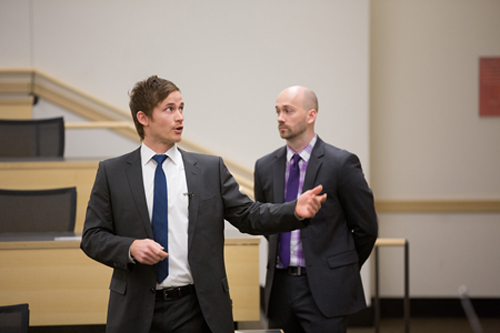Cavan Canavan, MBA ’12, and Grant Hughes, MBA/MS ’13, want to improve your workout through their startup, Focus Solutions.
Entrepreneurs are always thinking about the next great idea. For Cavan Canavan, MBA ’12, it came while sweating profusely. Canavan’s penchant for keeping in shape sparked the idea for Focus, a digital personal trainer that uses a high-tech wristband and a smartphone application to help people track, evaluate, and guide their workouts.
Canavan is the CEO and co-founder of Focus Solutions, a start-up company he launched in July 2012 to commercialize his product and roll it out to a potential nationwide market of 52 million gym members and athletes who want to improve their fitness level more effectively and efficiently. Grant Hughes, MBA/MS ’13, joined the venture last fall as co-founder, chief marketing officer, and head of business development. Synergy between the two partners has shifted the business into high gear. Recently, they filed for a patent on their proprietary technology and embarked on a seven-figure fundraising campaign.
“I’m not really a body builder, but I know the value of physical conditioning,” Canavan says. Unlike jogging, a well-rounded resistance workout is fairly complicated, combining a variety of lifting and strengthening exercises — each with different weights, repetitions, sets, and rest periods. “Trying to keep everything straight is difficult, and there is nothing available on the retail market to help people like me,” says Canavan, who gained a toehold in the sports-equipment industry while designing footwear for New Balance Athletic Shoe Inc. “I knew there had to be a better solution.”
Canavan’s strong entrepreneurial spirit, coupled with his passion for collecting and crunching data, prompted him to develop the concept for Focus during the 2012 winter term at Ross. He hired two Michigan electrical engineering students on a contractual basis to put together the first prototype and build the initial proof-of-concept algorithm. Focus started as a breadboard circuit the size of a coffee table, but has since slimmed down over four prototype generations to something resembling a chunky wristwatch. The device automatically identifies the type of exercise being done, records the workout details, and provides real-time audio or visual feedback via a smartphone.
Canavan and Hughes, who met through the U-M Design + Business Club, decided to focus exclusively on the resistance and body weight training market segment because they felt it is an underserved niche. However, they realized their product offering needed to have a secret sauce in order to stay ahead of the competition.
To gain an edge, the two entrepreneurs asked Hollywood celebrity trainer Ashley Conrad and former Wolverine athletic strength and conditioning coach Mike Barwis to create customized workouts and training programs. “With our product, users can have access to world-class exercise regimens developed by the pros,” Hughes says. Downloading a smartphone app, entering personal information, signing up with one of the trainers, and choosing a workout routine is the easy part. Following through on a weekly physical conditioning program is tougher. But Focus also functions as a virtual coach that monitors and motivates individuals while helping them correct problems like poor form.
Canavan and Hughes leveraged Ross resources, including the Mayleben Family Venture Shaping Grant program and the Zell Lurie Institute’s Dare to Dream Start-up Grant program, to hone their market focus and tone up their business plan. They secured a first-place finish in the final round of the 2013 Michigan Business Challenge, winning the $20,000 Pryor-Hale Award for Best Business. The duo currently is pitching to angel investors in Michigan and on the West Coast in an effort to raise $1 million in seed funding. They also plan to launch a crowdfunding blitz in the fall to attract small investors and create widespread buzz that will drive early orders for Focus. The final product is expected to be shelf-ready by the end of this year and begin shipping in January. Estimated sales are projected to hit 100,000 units by the end of 2014 and 1.6 million units by 2017.
The partners say their new venture is geared toward helping people lead healthier, more active lives. “If you build a product that you believe in, and that your customers really need and want, then you’ll be successful.”
— Claudia Capos

